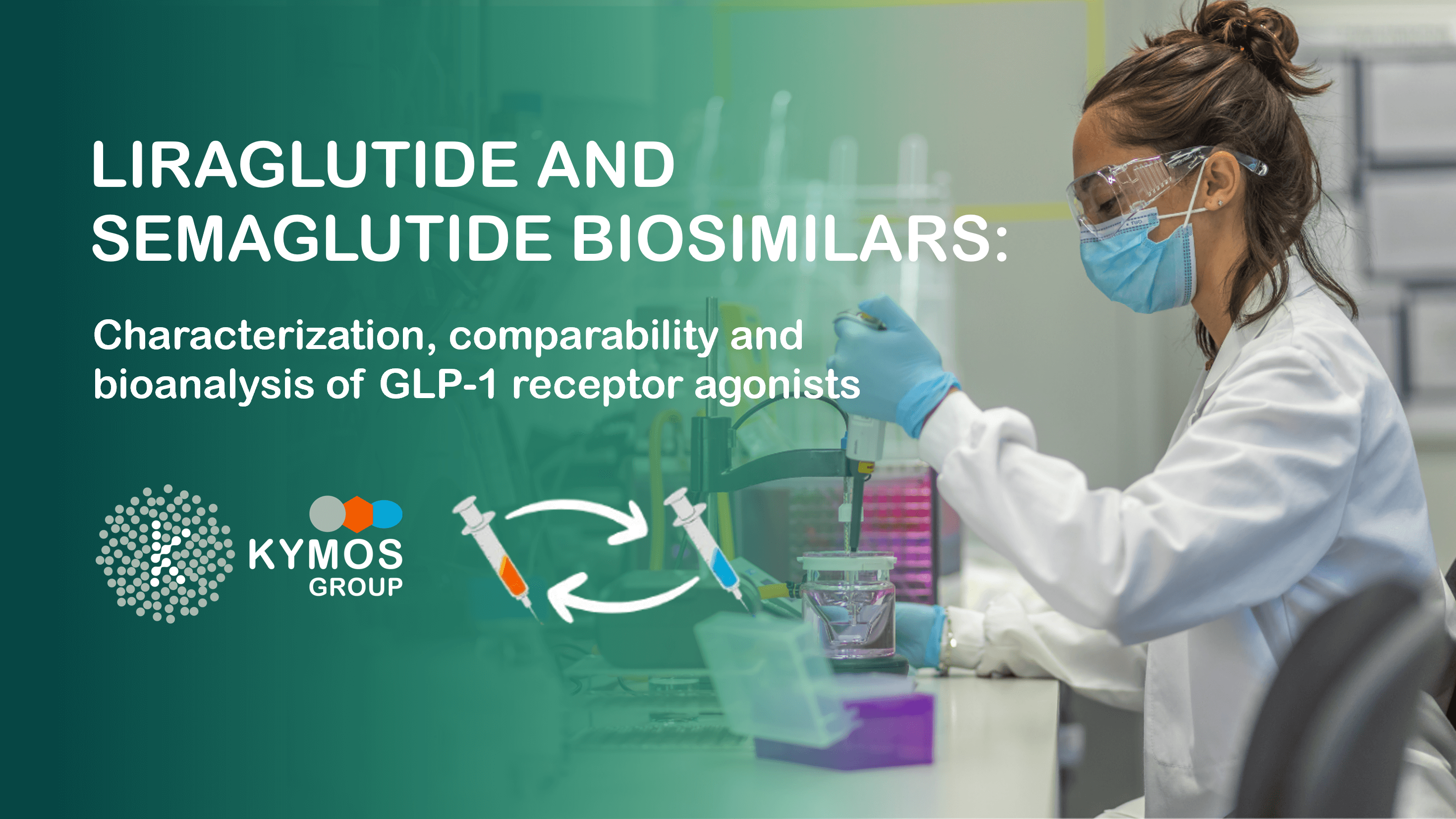
Liraglutide and Semaglutide have become key players in the pharmaceutical and healthcare industry as they are both being used and have been approved not only as an anti-diabetic medication but also as an obesity and weight loss treatment.
In combination with the huge growth of the biosimilar market in recent years and their patent expiry dates, they are one of the prime targets for the development and release of new biosimilar drugs based on them. In this article, we will expand on both these GLP-1 receptor agonists and how can Kymos assist in the characterization and comparability studies of their biosimilars and the bioanalytical services we offer for them.
Introduction to Liraglutide and Semaglutide
Glucagon-like peptide-1 (GLP-1) is an incretin hormone that has important effects on glycemic control as it stimulates insulin secretion and inhibits glucagon release, making it the perfect candidate for a therapeutically effective anti-diabetic agent. However, due to the pharmacokinetic profile of GLP-1, its half-life is very short as it is rapidly degraded (less than 2 minutes intravenous and 1-2h subcutaneous) limiting its therapeutic potential in its native form.
Due to the necessity of extending this half-life, both Liraglutide and Semaglutide were developed. These glucagon-like peptide-1 receptor agonists (GLP-1 RAs) have both extended half-lives while maintaining potency which has resulted in an effective treatment of Type-2 Diabetes. They were developed using structural modifications such as acylation with a fatty acid chain to facilitate albumin binding increasing its half-life to 13h after a single injection with Liraglutide, and then further refined to an increased human plasma half-life of 160h for Semaglutide which is also protected from dipeptidyl peptidase-4 cleavage. These modifications have made possible a daily dosage for Liraglutide, and a weekly dosage for Semaglutide in its injectable forms.
While the original goal of these peptides was to be therapeutically effective in people with Type-2 Diabetes, the effects on body weight were evident and due to these, versions of both Liraglutide and Semaglutide were developed for the treatment of obesity (the main difference being the quantity of dose; lower for diabetes and higher for weight loss).
Shortage of GLP-1 receptor agonists
While these therapeutic effects are beneficial for both diabetic and overweight patients, the weight loss effect has affected greatly the supply of these drugs. It has especially hit the type-2 diabetes population. We are currently experiencing a global shortage in supply due to an increase in off-label prescriptions of the diabetes versions being issued for weight loss instead of their original intended use.
Analyzing the current situation regarding GLP-1 receptor agonists, the formulations that are approved are as follows:
- For Liraglutide:
- Injectable form for Type-2 Diabetes treatment
- Injectable form for weight loss and obesity
- For Semaglutide:
- Injectable form for Type-2 Diabetes treatment
- Injectable form for weight loss and obesity
- Oral tablets for Type-2 Diabetes treatment
In both Liraglutide and Semaglutide, there is a need for more supplies, as with all medications containing these active ingredients, a global supply shortage exists. This issue could potentially be addressed with the emergence of new biosimilars, expected to be released in the coming months and years as patent expiry dates approach, and in the case of Liraglutide, have already occurred.
Development of biosimilars
Biosimilars market is firmly established and constantly growing due to the emergence of new drugs and active ingredients like Liraglutide and Semaglutide. However, its development presents huge complexity and challenges. Regulatory approval of new biosimilars requires an extensive comparability exercise against established and marketed reference products as it must include quality and clinical studies to demonstrate a high percentage of similarity in both terms of structure and function.
Comparative quality studies include protein structure, biological function, and in vitro pharmacodynamic studies. They should include comprehensive analyses of the proposed biosimilar and reference medicinal product using sensitive and orthogonal methods to determine:
- Similarities
- Differences
- Quantitative ranges of variability in the reference medicinal product
Comparative clinical studies are designed to confirm biosimilarity and to address any questions that may remain from previous analytical or functional studies. They include comparisons in terms of pharmacokinetics and studies of safety and efficacy in clinical studies.
Kymos’ experience with Liraglutide and Semaglutide
Kymos Group can assist biosimilar developers of GLP-1 receptor agonists with both quality and clinical comparability studies.
For quality comparability studies, we offer a comprehensive catalog of state-of-the-art analytical techniques coupled with extensive experience in their application to biosimilars. Specifically, for Liraglutide and Semaglutide, our biopharmaceutical and immunology departments have experience with:
- FT-IR Analysis
- Amino Acid Analysis
- Peptide Mapping (MS/MS Analysis)
- Bioactivity Studies
- Gel Electrophoresis
- Thioflavin T Assay Analysis
- Cell-based assays (CBA) for potency
For clinical comparability studies, Kymos provides bioanalytical support for comparability studies, covering activities like/plasma serum level measurement of both reference and biosimilar proteins, PK calculations and statistics, and immunogenicity studies. Additionally, we also offer a full one-stop-shop solution including the clinical part available through our trusted clinical trials partners.
Regarding bioanalysis, we have developed bioanalytical methods for several GLP 1 analogs in plasma of different species with limits of quantification in the low ng/mL range, the required sensibility for current preclinical and clinical studies. For clinical bioequivalence studies, method validation is free of cost.
If you require assistance with your biosimilars or any of your CMC or bioanalytical studies, please do contact us or send us an email to commercial@kymos.com

